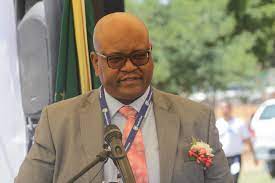
Standard Bank “Buy-a-Brick” BioHAB mushroom house expected soon

By Freeman ya Ngulu.
Standard Bank Group, MIT’s Center for Bits and Atoms, and the US-based architecture firm redhouse studio, have collaborated on an innovative social upliftment project in Namibia that uses mushroom fungal material to develop housing and food products.
The BioHAB site was completed in 2020, with an initial focus on food production, and participants are ramping up their mushroom production for food. But growing mushrooms also generates significant volumes of bio-waste, which the partnership is now looking to turn into shelter. The main structure will be made from mushroom cultivation waste.
The ‘Mushroom House’ project is part of Standard Bank’s corporate social responsibility programme to combat homelessness. It is backed by the bank’s ‘Buy a Brick’ initiative, which has set out to help 500,000 Namibians living in informal settlements.
With an experimental site already in place on the outskirts of Windhoek, BioHAB is utilizing methods pioneered by architect Chris Maurer for NASA’s Innovative Advanced Concepts programme, which is for creating a Mars habitat. With the mycelium thriving on the substrate of encroaching bush, these methods require very little water locally and no additional nutrients.
The BioHAB initiative for a sustainable economic and social ecosystem in Namibia, literally grows housing as well as food products for consumption or income generation using mycelium, which is essentially the root system that produces mushrooms. It will also aid in the reduction of bush encroachment, which has a negative impact on agriculture.
“We’re venturing into uncharted territory,” said Carolyn Kirksmith, Standard Bank Group’s Strategic Development Executive. “We need to find creative solutions that work.”
Speaking at the launch of the venture. First Lady of Namibia, Monica Geingos, highlighted the enormous work cut out for the architects of the future when she said urban planning will have to accommodate the needs of those people who will arrive in urban areas in the coming decades.
“Improving informal settlements is not just about decent shelter but it’s also about livelihoods. The problems unique to the informal settlements cannot be solved using conventional ideas, processes, regulations, or laws. If some standards and bylaws need to be adjusted to resolve the needs of the people – let them be adjusted,” she said.
Work on BioHAB started in May 2019, shortly after Standard Bank Group became a sponsor of the MIT Center for Bits and Atoms. Despite setbacks due to the COVID-19 pandemic, the initiative is making progress. “While we still have much to do, we are excited and cautiously optimistic about BioHAB going forward,” Kirksmith said.











































